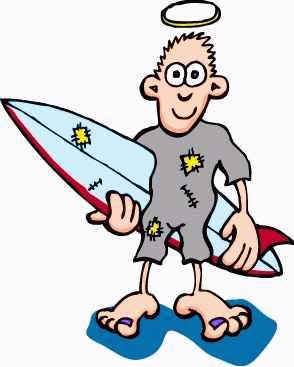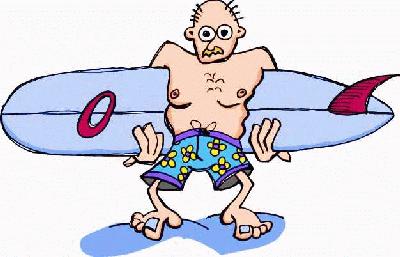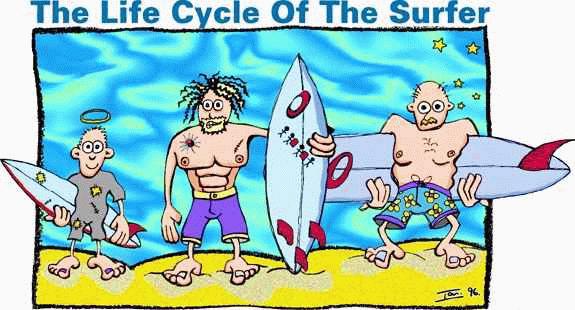
by Ann Skea
Illustrations by Ian Skea

Australia is certainly a multicultural society. I was strongly reminded of this when my son first took up surfing. Whilst he learned to walk on water, free-fall from incredible heights and outface the occasional shark, I learned to negotiate a fibreglass obstacle-course in the hallway, share my bath with cold, slippery wetsuits, and recognise the surfing hotline number on my phone bill. I also learned a good deal about cross-cultural communication.
Surfers display all the characteristics of a unique culture. Behaviour, dress, beliefs, value-system and language, all distinguish them as a specific cultural group. And the first hints that my son was joining this alien culture appeared in his language.
"It's filth, man. Really going off", he said to me one morning as he headed out of the door with his surfboard under his arm. From his haste and the look of glee on his face, I gathered that this was not a comment on water pollution.
"Sick", "filthy", "wicked", I learned, all reverse their meaning and become terms of approval. And every surfer is thrilled, or "stoked" to be "spat out of a tube". But "awesome" and "shithouse" mean what they always mean. So what about "cranking", "spitting", and "grinding"? And is a "gnarly" sea as lumpy as it sounds? Then again, who is Huey?
There are technical terms, too, which describe waves, board styles and surfing manoeuvres. Now that I can distinguish a tube from a wave that is closing-out, a malibu board from a three-fin thruster, and a cut-back manoeuvre from an ariel, (I think), my morning walk on the beach is not just healthy exercise for me - it is the source of an up-to-the-minute surf report for my son.
The behaviour of surfers is fairly obvious - they surf, whenever possible, as often as possible and for as long as possible, if the waves are good. So what about their shared beliefs and value system? Well, as with most cultures, these are consistent enough to foster stereotypes. And, as usual, the stereotypes are misleading.

"What sort of image do you have of surfers?", I recently asked a friend.
"Casual, easy-going, hairy, not worried about work, obsessed with waves. Nice guys.", he said.
"Do you know that they really get aggressive out there?", I asked. Do you know that they have fights over whose wave it is? That they are incredibly territorial about their home surf? That there is a strict hierarchy out there on the waves?".
Well, it was an eye-opener for me, too, when I first learned these things.
"Mellow", is a word constantly used by surfers. Phrases like, "a truly Zen board shaper", suggest mystical experiences. And there is real concern about ocean pollution, nuclear-testing and other ecological issues. But if someone "drops in" on a wave that a surfer regards as rightly his, he is quite likely to be "punched out". Even "grommets" (beginners) and "chicks" (women surfers) have to be taught the rules.
Out of the surf, though, "mellow" and "obsessive" are fairly accurate descriptions.
My son's friends look fearsome with their huge shoulders, assorted tattoos, dreadlocked hair and scruffy board shorts. Friends who call on me tend to peer nervously over my shoulder to see if there are surfers about. Even I find a roomful of surfers (four surfers make a roomful) a bit daunting. But they are pussycats, really.
If there is no surf to ride, they lie around the house watching endless surf videos and talking obsessively about the best waves, the best rides, the best wipe-outs, the best surfing-beaches, Fiji surf, Indo' surf, Hawaii surf, etc. etc. etc. If there are no waves for two days running, they get withdrawal symptoms and become fidgety and depressed. The slightest hint of a wind change sends them racing back to the beach to see if Huey has relented and sent them some waves.

Ah yes, Huey. Like the Greek god Poseidon, Huey controls the sea. Surfers offer up prayers to him, and he demands regular surf-board sacrifices on the best and biggest waves. In a moving ritual of cultural solidarity, those who have ridden a "killer wave" and suffered a "terminal wipe-out", have their ashes scattered by their mates on their home surf before they head off to Huey's great surfing kingdom in the sky. It's true!
To replace the snapped boards taken by Huey, and for the wetsuits, petrol, airfares to the best surfing beaches, etc., most surfers have to work. This is regarded as a necessary evil, and the best jobs have hours that suit the unpredictability of the surf. A recent advertisement for Deputy Editor of a surfing magazine gives you the picture. Item 6 on the list of required qualifications reads, "Must enjoy working odd hours - if you're a surfer they aint odd".
Surfers live to surf. Not even shark attacks will stop them. When a Bronze Whaler shark nibbled a surfer's hand recently at one Australian beach, other surfers carried on paddling out and surfing. "They're a tough breed out there in the desert", as one surf magazine report of the incident said cryptically.
And it's amazing what gets them stoked.
Today my son came home with three stitches in a deep gash that his surf board had made in his leg. He hadn't noticed the blood until he got out of the water a couple of hours after the accident. "I'm so glad I stayed out there." , he told me. "I did this one re-entry back-hander and I was fully upside-down when I did it."
Funny the things that people from other cultures enjoy, isn't it?
